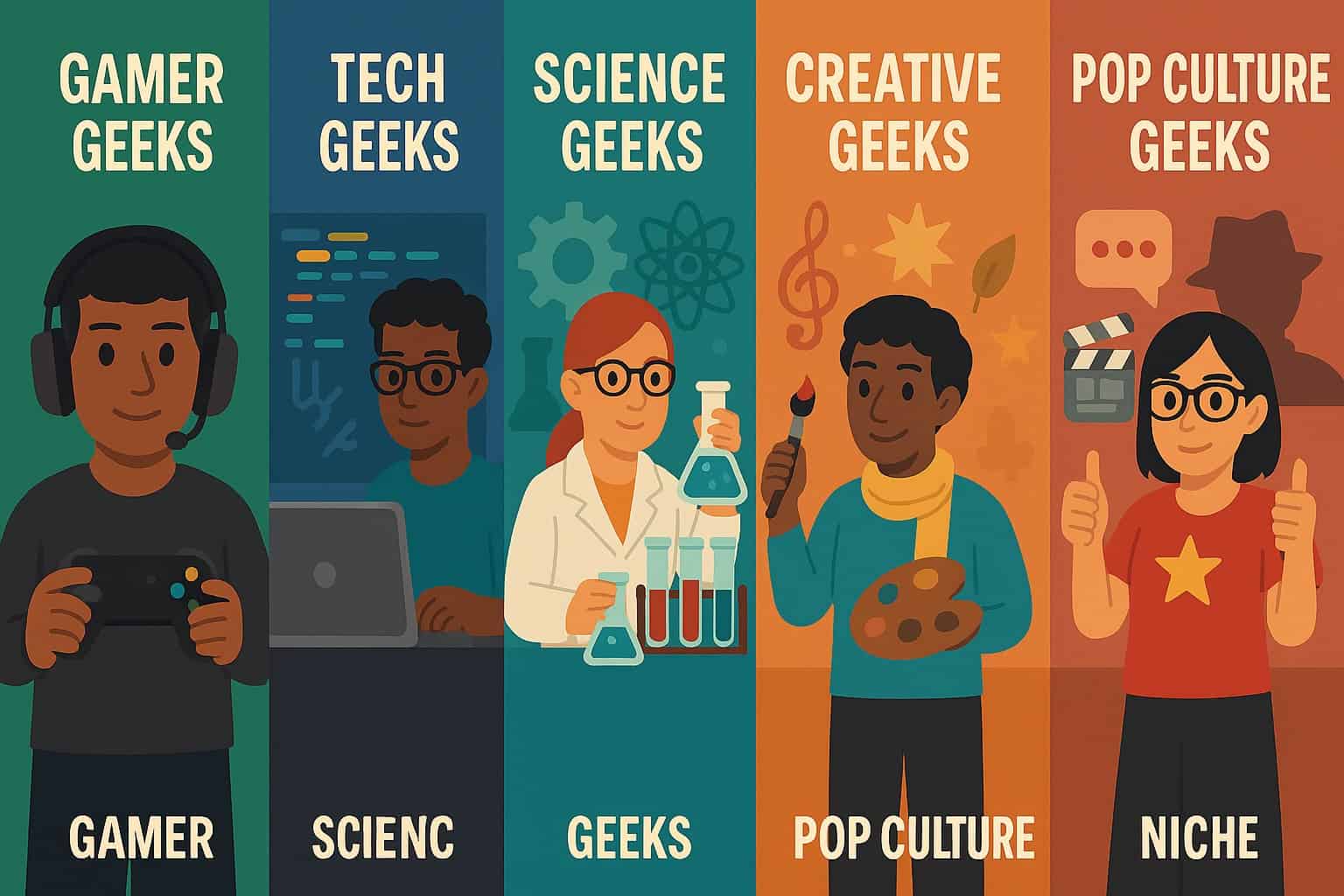Ever wonder about the many types of geeks and where you fit in? Back in 2002, a popular flowchart tried to rank geeks by their interests. Fast forward to 2025, and that simple chart has exploded into a universe of vibrant geek subcultures.
This guide will walk you through the modern geek landscape to help you find your people.
Key Takeaways
Geek culture has evolved from a simple 2002 flowchart into many distinct communities by 2025, covering gaming, tech, science, pop culture, and creative arts.
Tech geeks are passionate about hardware and software, with computer fans often spending over $1,500 on high-end components like the Serene Industries Icebreaker Keyboard.
Science geeks engage in hands-on experiments at home through citizen science projects like NASA’s Cloudspotting on Mars, while math lovers often express their passion through tattoos of equations or numbers.
Pop culture geeks enjoy collecting unique merchandise, like the Movie Lover Mug, and actively participate in online fan communities on platforms like Archive of Our Own (AO3).
By 2025, geek culture has become mainstream, with celebrities like Henry Cavill and Vin Diesel openly sharing their hobbies and helping to erase old divisions between fan groups.
Table of Contents
The Gamer Geek

Gamer Geeks are all about virtual worlds and epic quests. They dive deep into games like Fortnite or Elden Ring, often joining online communities on platforms like Discord and Reddit to share strategies and celebrate victories.
Video Game Enthusiasts

Video game enthusiasts are a cornerstone of modern geek culture. They log countless hours on platforms like PlayStation, Xbox, and PC, passionately debating everything from the lore of Resident Evil to the best character builds.
Many share their gameplay live, using tools like the Elgato Stream Deck Neo to manage their broadcasts and interact with viewers. Podcasts like Geek Gab serve as virtual hangouts where fans discuss new releases and gaming news.
True enthusiasts live the gaming lifestyle. They hunt for rare collector’s editions, follow developers on social media, and stay up for midnight game launches.

Online forums and Discord servers are their hubs for trading tips on finding easter eggs or unlocking secret characters. Depending on their play style, these fans often fall into different types of gamers.
Esports Fans

Esports fans get their thrills from watching pro gamers battle it out. They follow teams in games like League of Legends, Valorant, and Counter-Strike 2 with passionate dedication.
This isn’t just a passive hobby. The global esports audience is projected to exceed 640 million by the end of 2025, with the industry expected to generate $1.79 billion in revenue this year alone. Fans don’t just watch, they participate in the gaming culture.
- Active Engagement: Many create their own streaming setups to broadcast gameplay, using popular gear like the Elgato Stream Deck Neo, which was highlighted in the Esquire Gaming Awards.
- High-End Gear: Fans often invest in professional-grade accessories, like mechanical keyboards and high-fidelity headsets, to enhance their own gaming experience.
- Community Dreams: The most dedicated fans often dream of taking their passion to the next level and learning how to start an esports team themselves.
Choosing a gift for an esports fan requires some thought, as generic gear can miss the mark. It’s always best to find out their favorite teams and games before buying.
The Tech Geek

Tech Geeks are fascinated by the latest gadgets, code, and digital trends. While others are scrolling through social media, they’re tinkering with WordPress plugins or debating the ethics of Agentic AI, a top tech trend for 2025 identified by Gartner.
Computer Enthusiasts

Computer lovers are always chasing the next hardware or software upgrade. They happily spend hours building custom PCs, comparing performance benchmarks, and debating the merits of different processors from companies like Intel and AMD.
Many own powerful portable devices like the MSI Claw 8 AI+ Portable Gaming PC, which retails for around $899.99, and dream of luxury gear like the $1,500 Serene Industries Icebreaker Keyboard.
Their passion extends to software, too. They often learn to code, develop WordPress sites, and follow emerging AI topics. Thanks to open-source models, many are now building AI-powered DIY projects with accessible tools like the Raspberry Pi 5.
Their homes often feature impressive DIY setups with custom rigs and multiple monitors. Online, they gather on forums like the r/buildapc subreddit to share ideas and troubleshoot complex computer issues.
Software Developers

Software developers are the architects of our digital world, creating the apps and games you use every day. It’s a solid career choice for tech lovers, with the median salary for a software developer in the U.S. being around $111,845 to $120,000 per year as of late 2025.
Many developers, sometimes called vibe coders, start with a computer science degree, while others build their skills through online courses or intensive coding bootcamps like General Assembly or Flatiron School.
I spent three fun years as a junior developer, and trust me, this group takes nerdiness seriously. Lunchtime often involves spirited arguments over favorite programming languages, or proudly sharing the latest DIY gadget hacks.
On their shelves, you’ll likely find sci-fi classics like the Thrawn Trilogy sitting next to hefty coding manuals. This unique blend of creativity and logic makes software development a perfect fit for anyone who loves solving puzzles and building cool things.
The Science Geek

Science geeks are driven by the thrill of discovery and the elegance of data. They spend their free time reading research papers, testing theories in home labs, and solving complex equations just for the fun of it.
Lab Geeks

Lab geeks are happiest when surrounded by microscopes, test tubes, and scientific breakthroughs. They spend hours running experiments, meticulously recording data, and analyzing details invisible to the naked eye.
My friend Alex, a biologist, spends her weekends happily growing bacteria cultures just for fun. Lab geeks often use specialized terms like “titration” or “polymerase chain reaction,” sharing a unique language.
The difference between science and fooling around is writing it down.
What sets lab geeks apart from other geeks and nerds is their focus on applying knowledge to solve real-world problems. They often set up small labs at home for DIY science projects.
Many also contribute to larger discoveries through citizen science programs. In early 2025, NASA announced funding for 25 new projects where the public can help with research, from spotting Martian clouds to studying the Earth’s atmosphere using smartphones.
Math Nerds
Math nerds find beauty in numbers where most people just see a headache. They genuinely enjoy solving complex equations and get a thrill from concepts like prime numbers, perfect squares, and hidden patterns.
While they may have been teased in school, their skills are highly respected in fields like engineering, data science, and finance. Their sharp analytical thinking is a valuable asset.
- Quick Calculations: They’re the ones who can calculate a 20% tip faster than you can open your phone’s calculator.
- Permanent Passion: Some showcase their love for math by getting math tattoos of famous formulas, favorite numbers, or the golden ratio.
- Puzzle Masters: They often excel at logic puzzles, brain teasers, and strategy games like chess or Go.
Their ability to spot patterns helps them see the world differently, recognizing the mathematical sequences in a sunflower’s spirals or the fractal shapes of a pinecone. This unique perspective makes them excellent problem-solvers.
The Pop Culture Geek

Pop Culture Geeks are experts on the latest Marvel movies, binge-worthy Netflix series, and everything in between. They can quote “Star Wars” from memory and proudly display their Funko Pop collection.
Movie Buffs
Movie lovers live for the magic of cinema. They can recite dialogue from obscure cult classics and spend hours discussing film theory. Many set up impressive home theaters or collect film memorabilia to celebrate their passion.
In 2025, many film fans use social platforms like Letterboxd to log, review, and discuss films with a global community. For a perfect gift, GrindRoyale’s Movie Lover Mug is a great choice.
It has a 5-star rating and comes in an 11oz size for $19.92 or a 15oz size for $27.13. The mug is a simple way for film fans to show off their hobby during a movie marathon.
TV Series Fans
While movie buffs love the big screen, TV series fans are all about weekly episodes and weekend binges. They remember every minor plot point and can recite iconic lines on command.
They follow character arcs over multiple seasons and debate plot twists on forums like Reddit. Fan communities are a huge part of the experience, with fans sharing theories and creating their own content.
A true TV series geek doesn’t just watch shows—they experience them.
This passion goes beyond just watching. Fans engage with their favorite shows in many ways:
- Conventions and Cosplay: They attend fan conventions, which have grown into a multi-billion dollar industry, to meet actors and show off incredible cosplay.
- Fan Fiction: Many write or read fan fiction on platforms like Archive of Our Own (AO3) to explore character relationships and alternative storylines.
- Community Events: They organize trivia nights and viewing parties to share the experience with fellow fans.
The Creative Geek

Creative Geeks are makers and innovators who turn their ideas into reality. They blend technical skill with artistic vision to create digital art, 3D-printed models, or custom music tracks.
They are a key part of the creator economy, which is valued at over $250 billion and is expected to nearly double by 2027, according to a study by Goldman Sachs.
Art and Design Enthusiasts
Art geeks have a keen eye for visuals and design concepts. They can talk for hours about typography and color theory, and they often create their own original work.
Many use powerful software like Procreate on the iPad or Adobe Illustrator to bring their ideas to life. They might find inspiration from platforms like KONSTABR, which showcases over 181 nerd-inspired designs from artists around the world.
These creatives often look for unique items, like the “Nerdy Pig” logo or the minimalist branding for the “Kanone” project, as inspiration for their own work.
Their living spaces are often filled with sketchbooks, tablets, and mood boards. They are active in the DIY scene, creating fan art based on their favorite characters and franchises.
Whether they prefer digital artwork or traditional methods, they dedicate hours to perfecting details that most people would overlook. Their unique creations offer a personal and authentic take on geek culture.
Music Geeks
Music geeks are always on the hunt for rare vinyl, obscure bands, and the perfect beat. In 2025, many still proudly own turntables, arguing that the warmth of analog audio is superior to digital streaming.
They are meticulous curators, creating detailed playlists organized by mood, genre, or era. Like Weird Al Yankovic, who has 1.8 million followers on X (formerly Twitter), they know every lyric, producer credit, and behind-the-scenes story of their favorite albums.
- Deep Listeners: They can easily spot hidden samples and identify unusual time signatures that most listeners miss.
- Dedicated Collectors: They will drive for hours to find a limited-edition record pressing.
- Active Participants: Many play instruments or produce their own music, valuing both technical skill and emotional expression.
Thanks to the mainstreaming of nerd culture that Yankovic often discusses, this kind of specialized music knowledge is now more respected than ever. Their playlists can jump from an obscure jazz B-side to a video game soundtrack, connecting different geeky interests through sound.
The Niche Geek

Niche geeks find their passion in the specialized corners of pop culture. They develop deep expertise in areas like anime, manga, and rare comic books, forming dedicated, close-knit communities.
Anime Fans
Long gone is the outdated stereotype of the “pale and geeky” anime fan. Today, this vibrant fandom includes people of all ages and backgrounds, drawn together by a love for Japanese animation.
The global anime market reflects this, growing from $28.55 billion in 2024 to an expected $31.51 billion in 2025. Fans express their passion in many ways.
- Cosplay and Art: They create intricate cosplay outfits and beautiful fan art to celebrate their favorite characters.
- Collecting: Many collect detailed figurines and other merchandise.
- Language Learning: Some dedicated fans even learn Japanese to enjoy series without subtitles.
Fans connect at conventions and through streaming services like Crunchyroll, which make anime more accessible than ever. The genre’s variety is immense, from epic sci-fi series featuring incredible anime spaceships to quiet slice-of-life stories.
Comic Book Collectors
While anime fans love animation, comic collectors are on a different kind of quest. For them, the thrill is in hunting down rare issues and building a curated library.
Online communities like the League of Comic Geeks provide a space for enthusiasts to connect and share their latest finds. Many also use Comic Collection Software to digitally catalog their growing collections.
My own comic journey started with just three Batman issues. Now, my collection has grown so much that I’m in serious need of dedicated storage boxes!
Serious collectors rely on resources like the Comic Book Database, which lists over 500,000 titles. A key part of the hobby is professional grading from services like CGC (Certified Guaranty Company), which authenticates and preserves valuable comics.
The stakes can be high. In 2024, a high-grade copy of Action Comics #1, Superman’s debut, sold for a record-breaking $6 million at Heritage Auctions. Local comic book stores are often community hubs where fans trade tips and show off their prized possessions.
How Will Geek Culture Evolve in 2025?

By 2025, geek culture is no longer niche, it’s a dominant force in mainstream entertainment. The lines between different names of nerds are blurring as more people proudly embrace their passions.
Celebrities like Henry Cavill (a known PC gamer and Warhammer fan) and Vin Diesel (a longtime Dungeons & Dragons player) have helped make geek hobbies cool and accessible. This is a major shift from the past when being called a “nerd” was an insult.
Today, being a “nerd” or “geek” simply means you’re passionate, knowledgeable, and dedicated to your interests.
Geek communities are also changing. The old hierarchies are disappearing as respect grows between different types of geeks. I’ve seen this firsthand in my local gaming group, where console and PC gamers who once argued now play together on cross-platform titles.
This crossover creates a richer, more vibrant fan culture. Gamer geeks share strategies, tech geeks offer advice on building cosplay props, and anime fans inspire incredible fan art. The result is a more collaborative and welcoming experience for everyone.
People Also Ask
What are the main types of geeks in nerd subcultures in 2025?
In 2025, the main types of geeks include those focused on gaming, technology, science, pop culture (movies, TV), creative pursuits (art, music), and niche interests like anime and comic books. Each group has its own unique communities and ways of expressing its passion.
How can I know which geek culture fits me best?
Think about what you love to do in your free time. What topics get you excited and talking for hours? Your natural passions and the communities you feel drawn to will point you toward the geek culture that fits you best.
Is it possible to fit into multiple geek cultures?
Absolutely! Most people have interests that span several geek categories. It’s common for a movie buff to also be a gamer, or for a tech geek to love collecting comics. The lines are very blurry, and that’s part of the fun.
What’s changed about geek cultures recently?
Geek culture has become much more mainstream and accepted. Hobbies that were once considered niche are now popular, and social media has made it easier than ever for fans to connect and form diverse global communities.
References
https://player.fm/podcasts/Fantasy-Geeks
https://www.esquire.com/lifestyle/tech/g14381053/best-video-game-gamer-gifts/ (2025-04-15)
https://thegadgetflow.com/categories/gadgets-for-geeks/page/2/
https://www.townandcountrymag.com/leisure/g13094996/cool-tech-gifts/
https://www.sheknows.com/living/articles/992967/11-jobs-that-bring-out-your-inner-nerd/
https://www.mastersinit.org/geeks-vs-nerds/
https://www.etsy.com/ie/listing/1800848633/movie-lover-mug90s-movies-movie-lover
https://99designs.com/inspiration/designs/nerd
https://thequietus.com/interviews/weird-al-yankovic-interview/
https://www.researchgate.net/publication/301198112_Pale_and_geeky_Prevailing_stereotypes_of_anime_fans (2016-04-11)
https://hackaday.com/2021/06/12/what-every-geek-must-know/
http://leagueofcomicgeeks.com/


